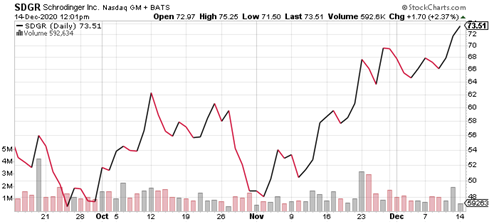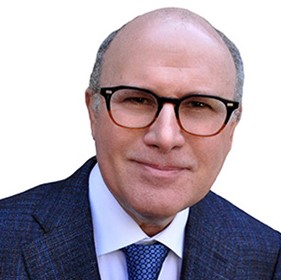Schrödinger Leads Breakthrough in Drug Discovery
Big stock market moves are always about a change in narrative. Some healthcare stocks are undergoing one of those changes. And it started in a computer lab in London, England.
DeepMind is an artificial intelligence company owned by Alphabet Inc. (Nasdaq: GOOGL). Last week, the company’s algorithms solved protein folding, a biology riddle that has puzzled researchers for five decades. The solution changes the narrative about risk.
This means many healthcare businesses are dramatically underpriced.
Most modern drug therapies are based on scientists manipulating amino acids to make proteins. As the proteins develop, they fold into extremely specific shapes that define their function.
Related Post: Schrödinger Discovers Success
Prior to AlphaFold, the DeepMind algorithm, there was no way to reliably predict what 3D shape these proteins would form. This is why investing in biotechnology carries so much risk. Developing new molecular medicines is largely hit or miss.
In theory, AlphaFold erases the misses.
It’s like a cheat sheet. With further computation, researchers at pharma and biotech companies should be able to reliably develop proteins for specific functions. It means faster, cheaper drug discovery with much less risk.
The rapid development of AlphaFold is shocking. In 2018, DeepMind software engineers decided to participate in the Critical Assessment of protein Structure Prediction. CASP is a contest run by the biology community to assess the progress of predictive techniques. Since 1994, CASP has been run every two years.
In CASP 13, AlphaFold 1 was far and away the best tool in the field. It managed to get the basic shapes correct, but the details, such as where the atoms sit, were misplaced.
By CASP 14, less than three years later, the second incarnation of AlphaFold was exponentially better, achieving a proficiency rate of 92.4%.
For perspective, this matches the accuracy of expensive, time consuming laboratory techniques such as nuclear magnetic resonance, x-ray crystallography and cryo-electron microscopy, according to a report at MIT Technology Review.
Lab analysis for a single protein can take years and cost hundreds and thousands of dollars. Results from AlphaFold 2 are available in a few days.
And that is the investment story in a nutshell.
Solving protein folding fundamentally changes the narrative about drug discovery. Proven computational AI is a game-changer.
AlphaFold shifts the narrative about drug development away from extreme costs and long delays. Investors will begin revaluing computational biology facilitators higher.
That’s precisely why facilitators like Schrödinger, Inc. (Nasdaq: SDGR) now have a tremendous advantage.They’ve built a cutting-edge computational AI and physics-based predictive analytics platform. The promise is to help companies cut the cost of drug discover by using computer simulation.
The New York City-based company was founded in 1990 and boasts 150 Ph.D. scientists. Together, they have published 400 peer-reviewed white papers on physics-based computer modelling. In the prospectus filed with the Securities and Exchange Commission in January, Schrödinger managers took the unusual step of claiming a big lead over the nearest competitors.
It’s a bold claim backed up by facts.
Schrödinger software is in use at 1,250 academic institutions worldwide. The platform also claims the top 20 pharmaceutical companies by sales as customers. And its client retention rate is 96% out of its 1,150 clients.
Plus, the industry is expected to spend $202 billion on drug discovery by 2022. So far, Schrodinger has captured only a tiny sliver of that sum. The company had $85.5 million in sales in 2019, the last full fiscal year.
Related Post: Danaher Tests Positive for Anti-Virus Supply Chain
However, in November, Bristol-Myers Squibb Co. (NYSE: BMY) announced it would pay $55 million upfront to access Schrödinger’s platform. The pair will jointly develop drug treatments for five small molecules designed with the software. If the drugs pan out, the deal could be worth an additional $2.7 billion, plus a royalty to Schrödinger.
The AlphaFold news means the odds of getting those, and a lot of other drugs, to market is suddenly much better.
Schrödinger trades at 1,104 times forward earnings and 46.7 times sales. While those metrics may seem grossly expensive, keep in mind where the computational biology is headed and Schrödinger’s place.
Longer-term investors should buy shares into weakness.
Best wishes,
Jon D. Markman




